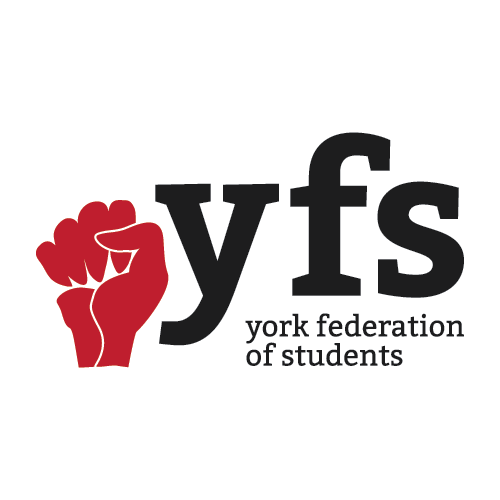CUPE 3903 Strike
Do you have questions or concerns about the strike by CUPE 3903 Units 1, 2, and 3, the union representing all Teaching Assistants, Contract Faculty, and Graduate Assistants?
We've done our best to put together a list of answers to Frequently Asked Questions (FAQs), as well as how to get involved to help end the strike. This page will be updated periodically, and information will also be shared through @YFSLocal68 on Instagram.
How to Get Involved
Are you an undergraduate student looking to be more involved with the strike?
As the ongoing labour disruption progresses, we understand that undergraduate students might want to be more involved with the strike, whether that’s supporting your TA’s and instructors, or joining your students union on the picket lines.
Ultimately, our classrooms and learning environments are the teaching and working environment for CUPE 3903 members. To see this strike come to and end, students and workers must unite and encourage the university to return to the bargaining table.
Register here to learn more from both YFS and CUPE 3903 and the many ways that you can get involved with the strike and help end the strike!
Answers to Frequently Asked Questions
What is a strike?
A strike is a legal step that unionized workers can take when they can’t reach an agreement with their employer when bargaining new collective agreements. A strike is a cessation of work, a refusal to work, or a refusal to continue to work, by employees for the purpose of compelling their employer to agree to terms or conditions of employment.
The withdrawal of labour means not doing any of the work associated with your contract, e.g. if you are a TA, you’re not running tutorials, not attending lectures, not grading assignments, not holding office hours, etc. Once the Bargaining Team achieves a tentative agreement, it will be brought to a ratification vote. If the membership (the workers) vote to ratify the new agreement, the strike is over.
What is a picket line?
Picket lines are a means to communicate grievances and seek support for a strike. They help build solidarity within the bargaining unit and with other supporters. Picketing involves the prevention of road access into campuses to provide students, staff and community members with information on the strike and CUPE 3903’s demands.
A picket line is the legal blocking of roadways and entrances to the university, where traffic is slowed in order to disrupt the operation of the university. The goal of picketing is slowing down or stopping traffic coming onto York’s campuses.
So what counts as crossing a picket line?
- Continuing to attend classes and going about business as usual counts as crossing a picket line, Including online classes.
- Crossing a picket line occurs when you go past the barrier of the CUPE 3903 strike onto campus.
- Even walking through a building or across a parking lot can be considered crossing the picket line.
- Students do have the right to cross it, but showing solidarity with the strike means avoiding crossing as much as you’re able.
- Members can try to dissuade people from crossing the picket line by sharing information about why CUPE 3903 is on strike and what the issues at hand are.
Who is going on strike?
Members of CUPE 3903 Unit 1 (Teaching Assistants), Unit 2 (Contract Faculty) and Unit 3 (Graduate/Research Assistants) have voted to go on strike as of February 22nd, 2024. CUPE 3903 represents the contract faculty, teaching assistants, graduate assistants, and research assistants at York University. With almost 3,700 members, CUPE 3903 is the largest trade union on campus.
Will this impact commuters or students living in residence?
Students may experience delays in commuting to campus as there will be picket line roadblocks at all major entrances into the York University Keele Campus between the hours of 7:30AM - 3:30PM. This affects students commuting using cars, transportation buses, Uber, Lyft, and more. TTC Train stations are open for commuters. Members can also expect disruptions in food services available on campus. Additionally, some services of the university may have alternate hours/methods of operation.
Why is CUPE 3903 going on strike?
Your TAs and contract faculty do 60% of the teaching at York and, to maintain and improve the quality of your education, need to live with security and dignity.
For more information regarding why CUPE 3903 is going on strike, feel free to contact the strikeinfo@yfs.ca
What does this mean for classes?
If classes go ahead during the strike, all students, including graduate students, are protected by the Senate Policy regarding labour disruptions, which gives students who choose not to attend class during a strike “immunity from penalty, to reasonable alternative access to materials covered in their absence, to reasonable extensions of deadlines and to such other remedy as Senate deems necessary and consistent with the principle of academic integrity." The full policy can be found here.

